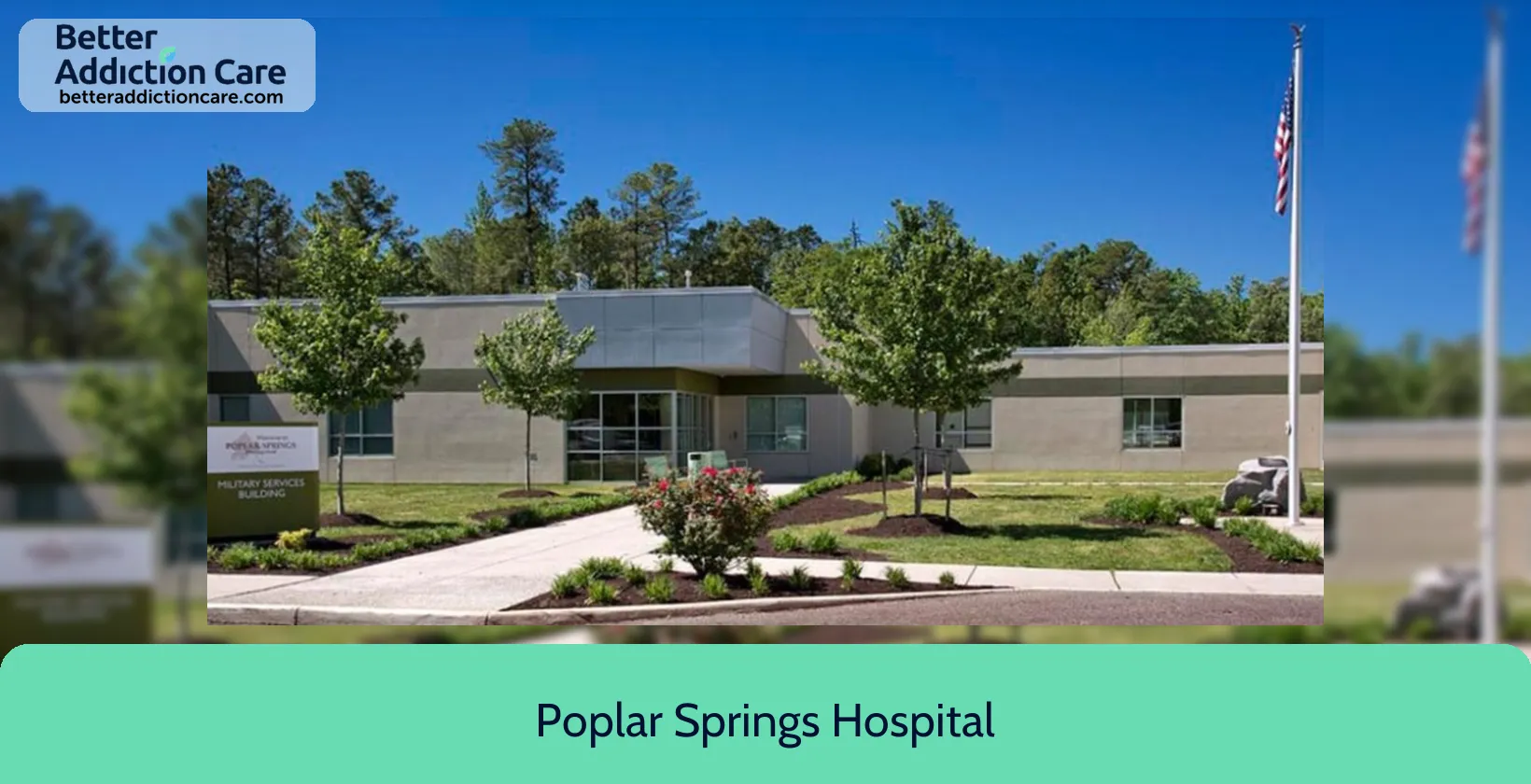Poplar Springs Hospital
Overview
Poplar Springs Hospital in Petersburg, Virginia, which is set on 25 acres of rural Virginia, provides adults and adolescents with all-encompassing therapy for mental health and drug use disorders. The hospital offers a variety of programs, such as detox, inpatient, and outpatient care; moreover, it offers various specialist tracks for military people and programs specifically designed for female adolescents.
A wide range of facilities are available at Poplar Springs Hospital to facilitate both therapeutic and recreational activities. In addition to many indoor leisure spaces, including two full-size gyms, an inground pool, a fitness center, basketball and volleyball courts, and a yoga studio, clients have access to a large outdoor exercise area. In addition, there's a performing arts stage and areas specifically designated for painting, music, and food. The grounds include individual outdoor patios and natural walks for people who prefer being outside, creating a tranquil setting that is ideal for healing and recuperation.
Numerous needs are met by the hospital's extensive array of treatment services, which include detoxification, addiction therapy, and crisis stabilization. They provide inpatient treatment for intense, organized care, medical detox to properly manage withdrawal symptoms, and flexible outpatient programs for those who can manage their recovery while continuing with their everyday duties.
Poplar Springs Hospital's adolescent programs are tailored to the specific developmental requirements of young people between the ages of 11 and 17. These programs include age-appropriate treatments. The military programs are designed to meet the unique needs of persons who are serving or have returned to civilian life, taking into account the unique problems they confront.
Poplar Springs Hospital offers all patients aftercare and ongoing treatment to promote long-term rehabilitation. This includes community ties, continuing counseling, and resource availability that support people in maintaining their recovery after the completion of a treatment program.
Poplar Springs Hospital is a top option for those looking for all-encompassing treatment for mental health and drug use issues because of its dedication to provide a thorough, organized, and supportive environment.
Poplar Springs Hospital at a Glance
Payment Options
- County or local government funds
- Community Mental Health Block Grants
- Medicaid
- Other State funds
- Private health insurance
Assessments
- Comprehensive mental health assessment
- Comprehensive substance use assessment
Age Groups
- Adults
- Children/adolescents
- Young adults
- Seniors or older adults
Operation
- Private for-profit organization
Highlights About Poplar Springs Hospital
6.71/10
With an overall rating of 6.71/10, this facility has following balanced range of services. Alcohol Rehabilitation: 8.00/10, Drug Rehab and Detox: 6.00/10, Insurance and Payments: 6.00/10, Treatment Options: 6.85/10.-
Alcohol Rehabilitation 8.00
-
Treatment Options 6.85
-
Drug Rehab and Detox 6.00
-
Insurance and Payments 6.00
Treatment At Poplar Springs Hospital
Treatment Conditions
- Mental health treatment
- Substance use treatment
- Co-occurring Disorders
- Opioid Treatement
Care Levels
- Hospital inpatient treatment
- Detoxification
- Outpatient
- Intensive outpatient treatment
Treatment Modalities
- Family counseling
- Individual psychotherapy
- Cognitive Behavioral Therapy
- Group counseling
- Experiential Therapy
Ancillary Services
Special Programs
- Children/adolescents with serious emotional disturbance (SED)
- Active duty military
- Clients who have experienced trauma
Get Help Now
Common Questions About Poplar Springs Hospital
Contact Information
Other Facilities in Petersburg

7.19

7.43

6.53
DISCLAIMER: The facility name, logo and brand are the property and registered trademarks of Envision One, and are being used for identification and informational purposes only. Use of these names, logos and brands shall not imply endorsement. BetterAddictionCare.com is not affiliated with or sponsored by Envision One.


